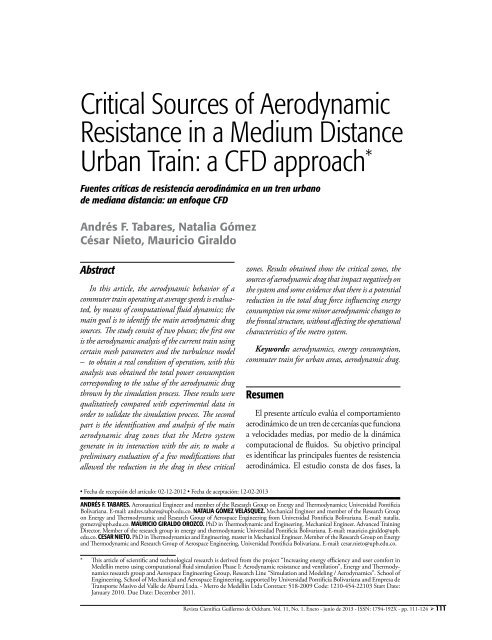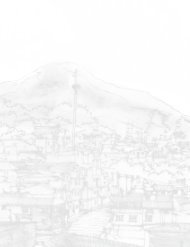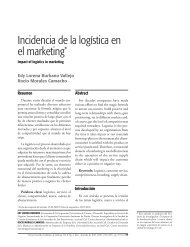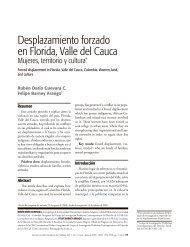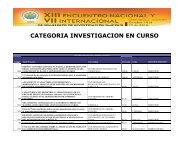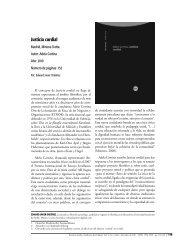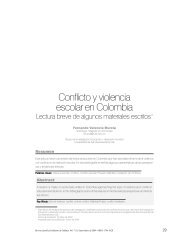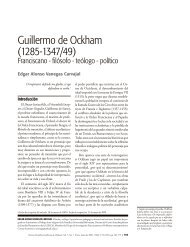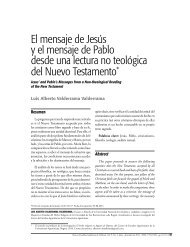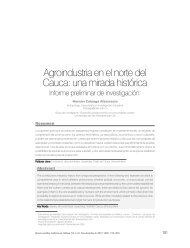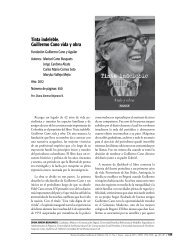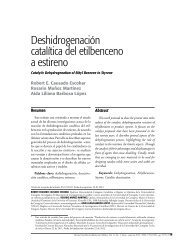Ciencias humanas, sociales y económicas - Universidad de San ...
Ciencias humanas, sociales y económicas - Universidad de San ...
Ciencias humanas, sociales y económicas - Universidad de San ...
Create successful ePaper yourself
Turn your PDF publications into a flip-book with our unique Google optimized e-Paper software.
Critical Sources of AerodynamicResistance in a Medium DistanceUrban Train: a CFD approach *Fuentes críticas <strong>de</strong> resistencia aerodinámica en un tren urbano<strong>de</strong> mediana distancia: un enfoque CFDAndrés F. Tabares, Natalia GómezCésar Nieto, Mauricio GiraldoAbstractIn this article, the aerodynamic behavior of acommuter train operating at average speeds is evaluated,by means of computational fluid dynamics; themain goal is to i<strong>de</strong>ntify the main aerodynamic dragsources. The study consist of two phases; the first oneis the aerodynamic analysis of the current train usingcertain mesh parameters and the turbulence mo<strong>de</strong>l– to obtain a real condition of operation, with thisanalysis was obtained the total power consumptioncorresponding to the value of the aerodynamic dragthrown by the simulation process. These results werequalitatively compared with experimental data inor<strong>de</strong>r to validate the simulation process. The secondpart is the i<strong>de</strong>ntification and analysis of the mainaerodynamic drag zones that the Metro systemgenerate in its interaction with the air, to make apreliminary evaluation of a few modifications thatallowed the reduction in the drag in these criticalzones. Results obtained show the critical zones, thesources of aerodynamic drag that impact negatively onthe system and some evi<strong>de</strong>nce that there is a potentialreduction in the total drag force influencing energyconsumption via some minor aerodynamic changes tothe frontal structure, without affecting the operationalcharacteristics of the metro system.Keywords: aerodynamics, energy consumption,commuter train for urban areas, aerodynamic drag.ResumenEl presente artículo evalúa el comportamientoaerodinámico <strong>de</strong> un tren <strong>de</strong> cercanías que funcionaa velocida<strong>de</strong>s medias, por medio <strong>de</strong> la dinámicacomputacional <strong>de</strong> fluidos. Su objetivo principales i<strong>de</strong>ntificar las principales fuentes <strong>de</strong> resistenciaaerodinámica. El estudio consta <strong>de</strong> dos fases, la• Fecha <strong>de</strong> recepción <strong>de</strong>l artículo: 02-12-2012 • Fecha <strong>de</strong> aceptación: 12-02-2013ANDRÉS F. TABARES. Aeronautical Engineer and member of the Research Group on Energy and Thermodynamics; <strong>Universidad</strong> PontificiaBolivariana. E-mail: andres.tabares@upb.edu.co. NATALIA GÓMEZ VELÁSQUEZ. Mechanical Engineer and member of the Research Groupon Energy and Thermodynamic and Research Group of Aerospace Engineering from <strong>Universidad</strong> Pontificia Bolivariana. E-mail: natalia.gomezv@upb.edu.co. MAURICIO GIRALDO OROZCO. PhD in Thermodynamic and Engineering. Mechanical Engineer. Advanced TrainingDirector. Member of the research group in energy and thermodynamic <strong>Universidad</strong> Pontificia Bolivariana. E-mail: mauricio.giraldo@upb.edu.co. CESAR NIETO. PhD in Thermodynamics and Engineering, master in Mechanical Engineer. Member of the Research Group on Energyand Thermodynamic and Research Group of Aerospace Engineering, <strong>Universidad</strong> Pontificia Bolivariana. E-mail: cesar.nieto@upb.edu.co.* This article of scientific and technological research is <strong>de</strong>rived from the project “Increasing energy efficiency and user comfort inMe<strong>de</strong>llín metro using computational fluid simulation Phase I: Aerodynamic resistance and ventilation”, Energy and Thermodynamicsresearch group and Aerospace Engineering Group, Research Line “Simulation and Mo<strong>de</strong>ling / Aerodynamics”. School ofEngineering, School of Mechanical and Aerospace Engineering, supported by <strong>Universidad</strong> Pontificia Bolivariana and Empresa <strong>de</strong>Transporte Masivo <strong>de</strong>l Valle <strong>de</strong> Aburrá Ltda. - Metro <strong>de</strong> Me<strong>de</strong>llín Ltda Contract: 518-2009 Co<strong>de</strong>: 1210-454-22103 Start Date:January 2010. Due Date: December 2011.Revista Científica Guillermo <strong>de</strong> Ockham. Vol. 11, No. 1. Enero - junio <strong>de</strong> 2013 - ISSN: 1794-192X - pp. 111-124 ‣ 111


